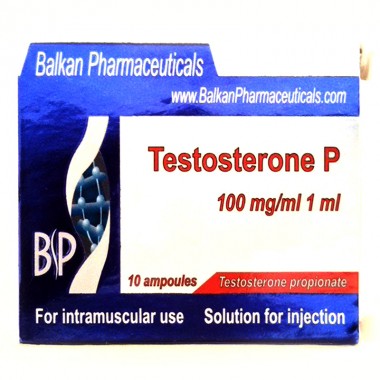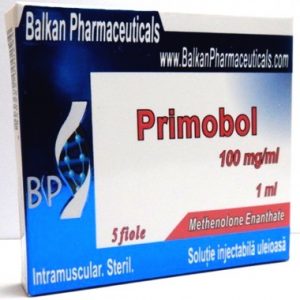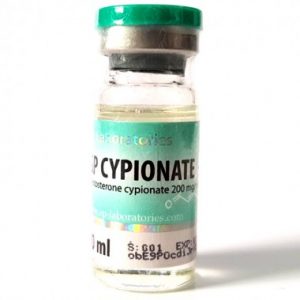Description
DESCRIPTION OF THE PREPARATION: Transparent oily solution, from light yellow to yellow, with a characteristic odor. Dosage form Oily solution for injections. PHARMACOTHERAPEUTIC GROUP and ATC code: Androgenic hormone, G03B A03. PHARMACOLOGICAL PROPERTIES: Pharmacodynamic properties Testosterone is the primary male sex hormone synthesized and secreted by the testicles. It stimulates the growth and development of male reproductive organs and secondary sexual characteristics (maturation of the prostate, seminal vesicles, penis and scrotum), distribution of male pattern hair on the face, pubis, chest), development of the larynx, body muscles and distribution of fat. Retains nitrogen, sodium, potassium and phosphorus, enhances anabolism and reduces protein catabolism. Premature increase in plasma testosterone concentration in the period before puberty causes closure of the epiphyses and growth arrest. Stimulates the production of erythropoietin and red blood cells. By the mechanism of negative feedback (feedback) inhibits the secretion of luteinizing and follicle-stimulating hormones of the pituitary gland and inhibits spermatogenesis. testosterone propionate has the biological and medicinal properties of a natural hormone, but is absorbed more slowly and is more stable in the body than testosterone. Testosterone propionate is prescribed mainly for men with sexual underdevelopment, functional disorders in the reproductive system, menopausal syndrome, and acromegaly. In some cases, testosterone propionate has a positive effect on prostatic hypertrophy: the general condition improves, urination disorders decrease, etc.Testosterone propionate may also have a positive effect on angioedema. The positive effect is associated with an improvement in blood circulation and metabolic processes in the heart muscle, there are also favorable changes in the lipid ratio in the blood, an increase in the lecithin / cholesterol ratio. The introduction of testosterone propionate to women causes inhibition of the gonadotropic function of the pituitary gland, inhibition of the function of the follicular apparatus and ovaries, endometrial atrophy, and suppression of the function of the mammary glands. It has a beneficial effect on complaints of menopause. pharmacokinetic properties. Testosterone propionate begins its action immediately after injection and lasts for 24 hours. In the blood, almost 98% of testosterone binds to a specific fraction of globulins that bind testosterone and estradiol. Biotransformation occurs in the liver to various 17-ketosteroids, which, after conjugation with glucuronic or sulfuric acid, are excreted in the urine (approximately 90%). About 6% of the absorbed drug is excreted in the feces in an unbound form. INDICATIONS: In men – androgen deficiency after castration, eunuchoidism, impotence of hormonal origin, symptoms of male menopause (decreased libido, mental and physical activity), with acromegaly, with prostatic hypertrophy, osteoporosis caused by androgen deficiency, with angioedema angina pectoris. In women – with menopausal vascular and nervous disorders in cases where estrogenic drugs are contraindicated (for tumors of the genital organs and mammary glands, uterine bleeding), simultaneously with radiation therapy for breast and ovarian cancer (usually in women under the age of 60 years) , with dysfunctional uterine bleeding in older women. METHOD OF APPLICATION AND DOSES: Intramuscularly, deep into the gluteal muscle. The dose is set individually depending on the indications and the patient's response. Men with eunuchoidism, congenital underdevelopment of the sex glands, their removal by surgery or as a result of trauma, as well as with acromegaly, are prescribed 25 mg daily or 50 mg every other day or 2 days later. The duration of treatment depends on the effectiveness of therapy and the nature of the disease. Usually treatment is carried out for a long time. After the improvement of the clinical picture, testosterone propionate is administered in maintenance doses: 5-10 mg daily or every other day. With impotence due to functional insufficiency of the gonads, overwork and nervous exhaustion, as well as with male menopausal syndrome, 10 mg daily or 25 mg 2-3 times a week for 1-2 months are prescribed. With prostatic hypertrophy in the initial stage, take 10 mg every other day for 1-2 months. In patients with angina pectoris, a positive effect is sometimes observed when using testosterone at 10-12.5 mg once a week, with good tolerance, the number of injections is increased to two per week (for 3-5 weeks). By the end of treatment, the dose and number of injections are again reduced. The course of treatment consists of 15-20 injections. Women over 45 with dysfunctional uterine bleeding are prescribed 10-25 mg every other day for 20-30 days until bleeding stops and atrophic cells appear in vaginal smears. Preliminary it is necessary to exclude malignant neoplasms of the uterus. With vascular and nervous disorders of menopausal origin in women and the presence of contraindications to the use of estrogens, testosterone propionate is administered at 10 mg every other day or 25 mg 2 times a week for 2-3 weeks. In malignant tumors of the breast or ovaries, testosterone propionate is administered at a dose of 50 mg daily for several months, then (depending on the results of treatment) the dose is reduced and maintenance doses are prescribed for a long time. As an addition to surgery or radiation therapy, the drug is prescribed for women under 60 years of age (older women are recommended to take estrogens). Higher intramuscular doses for adults: single 50 mg, daily 100 mg. The drug must not be administered intravenously! SIDE EFFECTS: Priapism and other signs of excessive sexual stimulation (frequent erections), in boys in the prepubertal period – accelerated sexual development, increased frequency of erections, enlargement of the penis and premature closure of the epiphyses, damage to spermatogenesis and impaired maturation of spermatozoa, oligospermia and a decrease in ejaculate volume, anomalies of the prostate gland, in women – bleeding from the birth canal, increased libido, with prolonged use of the drug, symptoms of virilization, hirsutism, gynecomastia, seborrhea, acne, oily skin, accelerated hair loss, sodium and water retention, edema, symptoms of hypercalcemia, thrombophlebitis, nausea, cholestatic jaundice, increased levels of liver aminotransferases (normalize as the intake is stopped), headache, depression, aggressiveness, anxiety, sleep disturbance, paresthesia. Pain, itching and hyperemia at the injection site are possible. CONTRAINDICATIONS: increased individual sensitivity to the components of the drug, prostate or breast carcinoma, nephrosis or nephrotic phase of nephritis, edema, hypercalcemia, abnormal liver function, diabetes mellitus, heart and coronary insufficiency, history of myocardial infarction, atherosclerosis in elderly men, pregnancy, feeding chest. OVERDOSE: In acute overdose, testosterone toxicity is extremely low. In chronic overdose, priapism may develop. In this case, treatment should be stopped, and after the disappearance of symptoms – start in smaller doses. PRECAUTIONS AND PECULIARITIES OF APPLICATION: In the event of androgen-dependent adverse reactions, testosterone treatment should be discontinued.After the disappearance of side effects, resume treatment at lower doses. Patients with latent or severe heart failure, impaired renal function, hypertension, epilepsy or migraine (or a history of these conditions) should be monitored constantly, since androgens can in some cases cause sodium and water retention. With prolonged use, check liver function. In patients with breast cancer, hypernephroma, lung cancer with bone metastases, check the level of calcium in the blood and urine. In prepubertal boys, androgens should be used with caution to avoid premature closure of the epiphyses and accelerated sexual development. INTERACTION WITH OTHER DRUGS: Increases the effectiveness of anticoagulants and hypoglycemic agents (you need to change doses), inhibits the excretion of cyclosporine. Liver enzyme inducers (barbiturates, rifampicin, carbamazepine, phenylbutazone, phenytoin) reduce the effect of testosterone. STORAGE CONDITIONS: Store at a temperature of 15-25°C, in a dry, dark place and out of the reach of children. EXPIRY DATE: 5 years. Do not use after the expiry date stated on the package. NAME AND ADDRESS of the manufacturer: SC Balkan Pharmaceuticals SRL st. Gradescu, 4 Chisinau, Republic of Moldova





Reviews
There are no reviews yet.